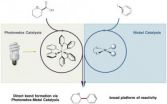(Press-News.org) Complex heart imaging can increase cancer risks for children throughout their lifetime, according to a new study co-authored by Le Bonheur Cardiologist Jason Johnson, MD, MHS. The study, which appears in the June 9, 2014 issue of the American Heart Association's journal Circulation, is the first in which researchers quantified cumulative radiation doses in pediatric heart patients and predicted lifetime cancer risks based on the types of exposures.
In the study, Johnson and fellow researchers found that radiation from standard X-rays don't significantly raise cancer risks for young children, in general, but children undergoing more complex procedures with higher radiation – like cardiac catherizations and computed tomography (CT) scans have higher risks.
"Cancer risk overall is relatively low, but we hope that this awareness will encourage providers to limit radiation exposure in children, when alternative procedures can offer the same benefit with less radiation," Johnson said.
Researchers reviewed medical records to find the most common imaging procedures, calculated how much radiation organs absorb during each procedure, then used a National Academy of Sciences report to analyze lifetime cancer risks based on the amounts of each procedure's exposure. Lifetime cancer risk increases ranged from 0.002 percent for chest X-rays to 0.4 percent for complex CT scans and cardiac catheterizations.
Johnson is an assistant professor at the University of Tennessee Health Science Center and specializes in congenital heart disease and advanced cardiovascular imaging. He helped complete the research at Duke University Medical Center, where he completed his pediatric cardiology and advance imaging fellowships.
To learn more about the study, visit lebonheur.org/physicians.
INFORMATION:
About Le Bonheur Children's Hospital
Le Bonheur Children's Hospital in Memphis, Tenn., treats more than 250,000 children each year in a 255-bed hospital that features state-of-the-art technology and family-friendly resources. Nationally recognized, Le Bonheur is ranked by U.S. News & World Report as a Best Children's Hospital. Serving as a primary teaching affiliate for the University Tennessee Health Science Center, the hospital trains more pediatricians than any other hospital in the state. For more information, please call (901) 287-6030 or visit lebonheur.org. Follow us on Twitter at twitter.com/lebonheurchild or like us at Facebook at facebook.com/lebonheurchildrens.
About the University of Tennessee Health Science Center
As the flagship statewide academic health system, the University of Tennessee Health Science Center is focused on a four-tier mission of education, research, clinical care and public service, all in support of a single goal: to improve the health of Tennesseans. Offering a broad range of postgraduate training opportunities, the main campus is located in Memphis and includes six colleges: Allied Health Sciences, Dentistry, Graduate Health Sciences, Medicine, Nursing and Pharmacy. UTHSC has additional College of Medicine and College of Pharmacy campuses in Knoxville, and a College of Medicine campus in Chattanooga. For more information, visit http://www.uthsc.edu.
Cancer risks increase with complex heart tests
Study measures radiation exposure for children with heart disease
2014-06-24
ELSE PRESS RELEASES FROM THIS DATE:
Those with episodic amnesia are not 'stuck in time,' says philosopher Carl Craver
2014-06-24
In 1981, a motorcycle accident left Toronto native Kent Cochrane with severe brain damage and dramatically impaired episodic memory. Following the accident, Cochrane could no longer remember events from his past. Nor could he predict specific events that might happen in the future.
When neuroscientist Endel Tulving, PhD, asked him to describe what he would do tomorrow, Cochrane could not answer and described his state of mind as "blank."
Psychologists and neuroscientists came to know Cochrane, who passed away earlier this year, simply as "KC." Many scientists have described ...
Mining mountains of data for medical insights
2014-06-24
Epidemiologists know that an important piece of evidence is often staring you in the face – but it's not always easy to see the forest for the trees.
Danish scientists recently teamed up with University of New Mexico researchers to test a powerful new method for predicting the progress of common diseases through time by teasing out previously undetected patterns from a very large data set – in this case, the health records of Denmark's entire population.
This approach maps out surprising correlations: a disease like gout – a form of arthritis – is strongly linked to ...
Research explains action of drug that may slow aging, related disease
2014-06-24
Dietary restriction is one of the most-researched methods for slowing the aging process. Now, a new article published in The Journals of Gerontology, Series A: Biological Sciences and Medical Sciences helps explain the action of a drug that appears to mimic that method — rapamycin.
Rapamycin, an antibiotic and immunosuppressant approved for use about 15 years ago, has drawn extensive interest for its apparent ability — at least in laboratory animal tests — to emulate the ability of dietary restriction in helping animals to live both longer and healthier.
However, this ...
Hormones affect voting behavior, Nebraska researchers find
2014-06-24
OMAHA, Neb. – Researchers from the University of Nebraska at Omaha (UNO), the University of Nebraska-Lincoln (UNL) and Rice University have released a study that shows hormone levels can affect voter turnout.
As witnessed by recent voter turnout in primary elections, participation in U.S. national elections is low, relative to other western democracies. In fact, voter turnout in biennial national elections ranges includes only 40 to 60 percent of eligible voters.
The study, published June 22 in Physiology and Behavior, reports that while participation in electoral ...
A collaboration of minds and metal
2014-06-24
This past January, Derek Ahneman, a graduate student in the lab of Abigail Doyle, a Princeton University associate professor of chemistry, began work on an ambitious new project: he proposed the merger of two areas of research to enable a powerful reaction that neither could broadly achieve on its own.
One field, which is the Doyle research group's domain, was nickel catalysis, wherein nickel squeezes in and out of chemical bonds to bring molecules together. The other field was photoredox catalysis, which uses light to initiate a series of unique bond-breaking and bond-making ...
Researchers publish one of the longest longitudinal studies of cognition in MS
2014-06-24
Researchers at Kessler Foundation and the Cleveland Clinic have published one of the longest longitudinal studies of cognition in multiple sclerosis (MS). The article, "Cognitive impairment in multiple sclerosis: An 18-year follow-up study," (DOI: 10.1016/j.msard.2014.03.004) was epublished by Multiple Sclerosis and Related Disorders on April 13, 2014. Results provide insight into the natural evolution of cognitive changes over time, an important consideration for researchers and clinicians. Authors are Lauren B. Strober, PhD, of Kessler Foundation and Stephen M. Rao, ...
3-D printer for the world's largest delta?
2014-06-24
Boulder, Colo., USA - Three main rivers -- the Ganges, Brahmaputra, and Meghna -- meet in the Bengal basin to form the world's largest delta system, which serves as a gateway between the Himalayan mountains and the vast, deep-ocean Bengal Fan. This GSA BULLETIN paper by Stephen Goodbred and colleagues presents a new understanding of how this mega-delta, the Ganges-Brahmaputra-Meghna delta, came together over the past 10,000 years.
To determine the delta's construction during the Holocene, Goodbred and colleagues followed geochemical fingerprints to trace the paths and ...
NOAA GOES-R satellite black wing ready for flight
2014-06-24
The solar array that will provide power to NOAA's GOES-R satellite has been tested, approved and shipped to a facility where it will be incorporated on the spacecraft. The five sections of the solar array come together as one to resemble a giant black wing.
On May 13, 2014, the GOES-R satellite solar array panels were successful deployed in a Lockheed Martin clean room in Sunnyvale, California. The completed solar array was then delivered to Lockheed Martin's facility near Denver.
"The GOES-R solar array generates more than 4,000 watts of power, twice as much as that ...
Combo tumor imaging can distinguish malignant & benign breast tumors, help avoid biopsies
2014-06-24
PHILADELPHIA — Imaging breast tumors using four approaches together can better distinguish malignant breast tumors from those that are benign, compared with imaging using fewer approaches, and this may help avoid repeat breast biopsies, according to a study published in Clinical Cancer Research, a journal of the American Association for Cancer Research.
"By assessing many functional processes involved in cancer development, a multiparameter PET-MRI of the breast allows for a better differentiation of benign and malignant breast tumors than currently used DCE-MRI alone. ...
What millennials want
2014-06-24
Millennials, the generation after Generation X, born in the 1980s and 1990s, form their own demographic group, with their own unique tastes. According to a June 23rd panel at the 2014 Institute of Food Technologists (IFT) Annual Meeting & Food Expo® in New Orleans, industry must keep up with Millennials high-speed, digital-age expectations, if they're going to gain and keep them as customers.
"Millennials are food savvy and tech savvy," said Heidi Curry, Senior Manager Baker, Global Research and Development with Dunkin' Brands. "In addition, they're socially and environmentally ...
LAST 30 PRESS RELEASES:
Novel camel antimicrobial peptides show promise against drug-resistant bacteria
Scientists discover why we know when to stop scratching an itch
A hidden reason inner ear cells die – and what it means for preventing hearing loss
Researchers discover how tuberculosis bacteria use a “stealth” mechanism to evade the immune system
New microscopy technique lets scientists see cells in unprecedented detail and color
Sometimes less is more: Scientists rethink how to pack medicine into tiny delivery capsules
Scientists build low-cost microscope to study living cells in zero gravity
The Biophysical Journal names Denis V. Titov the 2025 Paper of the Year-Early Career Investigator awardee
Scientists show how your body senses cold—and why menthol feels cool
Scientists deliver new molecule for getting DNA into cells
Study reveals insights about brain regions linked to OCD, informing potential treatments
Does ocean saltiness influence El Niño?
2026 Young Investigators: ONR celebrates new talent tackling warfighter challenges
Genetics help explain who gets the ‘telltale tingle’ from music, art and literature
Many Americans misunderstand medical aid in dying laws
Researchers publish landmark infectious disease study in ‘Science’
New NSF award supports innovative role-playing game approach to strengthening research security in academia
Kumar named to ACMA Emerging Leaders Program for 2026
AI language models could transform aquatic environmental risk assessment
New isotope tools reveal hidden pathways reshaping the global nitrogen cycle
Study reveals how antibiotic structure controls removal from water using biochar
Why chronic pain lasts longer in women: Immune cells offer clues
Toxic exposure creates epigenetic disease risk over 20 generations
More time spent on social media linked to steroid use intentions among boys and men
New study suggests a “kick it while it’s down” approach to cancer treatment could improve cure rates
Milken Institute, Ann Theodore Foundation launch new grant to support clinical trial for potential sarcoidosis treatment
New strategies boost effectiveness of CAR-NK therapy against cancer
Study: Adolescent cannabis use linked to doubling risk of psychotic and bipolar disorders
Invisible harms: drug-related deaths spike after hurricanes and tropical storms
Adolescent cannabis use and risk of psychotic, bipolar, depressive, and anxiety disorders
[Press-News.org] Cancer risks increase with complex heart testsStudy measures radiation exposure for children with heart disease


